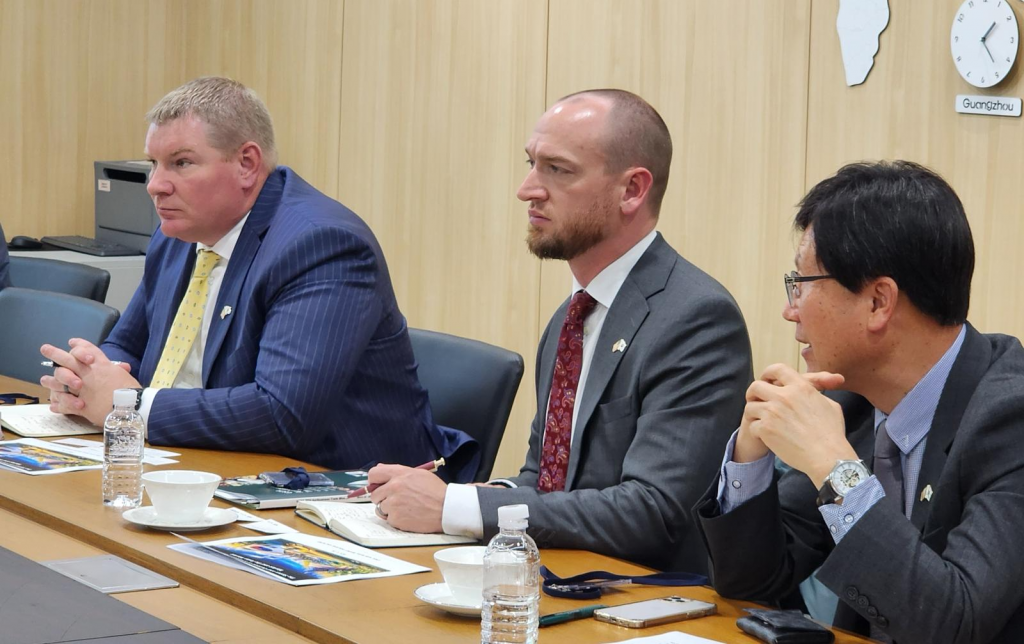Last week, U.S. Grains Council (USGC) member representatives, USGC Chairman Brent Boydston and Jake Comer, Growth Energy’s vice president of market development, joined organization staff in South Korea for the U.S. Department of Agriculture’s (USDA’s) Agricultural Trade Mission (ATM). The Council’s strategy for this specific mission focused on emphasizing the need for the Korean government and related industries to adopt an ethanol fuel policy and identify new demand for ethanol.
The trade mission offered the U.S. delegation the potential to increase and expand their agricultural exports to the region. Throughout the mission, the delegation held business-to-business meetings with importers, processors and distributors. The group also received market briefings from industry experts to help them better understand market dynamics and trends.
“Korea is primed for growth. While there for the ATM, we met with our partners in the country. While meeting with the Korean biofuels allies, we saw firsthand the interest in adding ethanol to their refined motor fuels,” Boydston said.
“In addition to biofuels, it was encouraging to learn that our Korean partners are interested in sustainability as well and recognize ethanol as a low-carbon, sustainable fuel.”
While on the ground, the Council’s delegation had time to internally talk through the Korean market and the organization’s strategies in the country before joining the larger group to meet with government officials, local associations and companies. Meetings with KC&A; Hanwha Solution; the Korea Feed Association; Korea Biofuels Forum and Bayer Korea, offered great takeaways for the group.
“South Korea has been implementing a four percent biodiesel renewable fuel standard (RFS) since January 2024 and plans to increase the blending ratio to eight percent in 2030. However, implementation of the bioethanol RFS continues to be delayed due to 100 percent import dependence and strong opposition from the oil refining industry. This ATM visit has great significance in that the USDA and the U.S. ethanol industry have come together to urge the Korean government and related industries to introduce an ethanol policy,” said Haksoo Kim, USGC director in Korea.
“South Korea, which has no domestic ethanol feed stock, is a market that the U.S. ethanol industry cannot give up, as fuel ethanol demand of 340 million gallons will occur when the E10 policy is introduced. South Korea, which declared 2050 carbon neutrality, has no realistic alternative to reduce carbon in the transportation sector other than ethanol. The Council will continue its efforts to develop Korea’s fuel ethanol market moving forward.”
During the 2022/2023 marketing year, Korea was the fourth-largest U.S. ethanol market, importing 98,917,997 gallons (35,077,303 bushels), in addition to being the second-largest distiller’s dried grains with solubles market, third-largest barley market and sixth-largest U.S. corn market. Last year’s recession in the local construction market and the increased use of low-cost substitutes resulted in a decline in local industrial demand and trans-shipment demand for Southeast Asian fuel and industrial ethanol market. The Council plans to not only develop the fuel ethanol market but also to increase demand for industrial ethanol for domestic consumption and transshipment through Ulsan Port.
About The U.S. Grains Council
The U.S. Grains Council develops export markets for U.S. barley, corn, sorghum and related products including distiller’s dried grains with solubles (DDGS) and ethanol. With full-time presence in 28 locations, the Council operates programs in more than 50 countries and the European Union. The Council believes exports are vital to global economic development and to U.S. agriculture’s profitability. Detailed information about the Council and its programs is online at www.grains.org.

